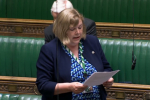Jane Hunt MP asked:
To ask the Secretary of State for Business, Energy and Industrial Strategy, what recent assessment he has made of hydrogen fuel cell manufacturing capacity in the UK; and what steps he is taking to increase investment in hydrogen fuel cell usage.
The Rt Hon Anne-Marie Trevelyan MP, Minister of State, responded:
The UK has strengths in electrochemical technologies. The 2019 Energy Innovation Needs Assessment identified that the UK has established research expertise and potential to establish a competitive fuel cell sector, capturing significant market share. British companies are already exporting this technology to markets in Europe and South East Asia. BEIS is working with industry to further assess these core strengths and potential opportunities for UK companies to support the domestic and global hydrogen economy. The forthcoming Hydrogen Strategy will set out what is required to build a hydrogen economy fit for 2030, Carbon Budget 6 and beyond, whilst maximising economic benefits.
The Government is providing a comprehensive framework of support for research, innovation and commercialisation of fuel cells. Four fuel cell projects have been funded through the BEIS Energy Entrepreneurs Fund, with a total grant of £2.2m, and will be in scope of the upcoming Longer Duration Energy Storage programme as part of the Net Zero Innovation Portfolio. Government is also supporting the uptake of fuel cell electric vehicles, expansion of hydrogen refuelling infrastructure and development of fuel cells for automotive through the £23m Hydrogen for Transport Programme, the £2m Fuel Cell Electric Vehicle Fleet Support Scheme, and the Advanced Propulsion Centre and Automotive Transformation Fund, which have already committed over £38m in grant towards 16 projects with a total value of almost £85m. In addition, the Tees Valley Hydrogen Transport Hub will support a shared understanding on the role of hydrogen in a decarbonised transport system and put UK industry and technology at its forefront. Fuel cells will be a key technology explored. It will build partnership working across the region, improving co-ordination and cross learning of strategic R&D infrastructure investments at scale, co-locating transport end-use with hydrogen production and refuelling.

